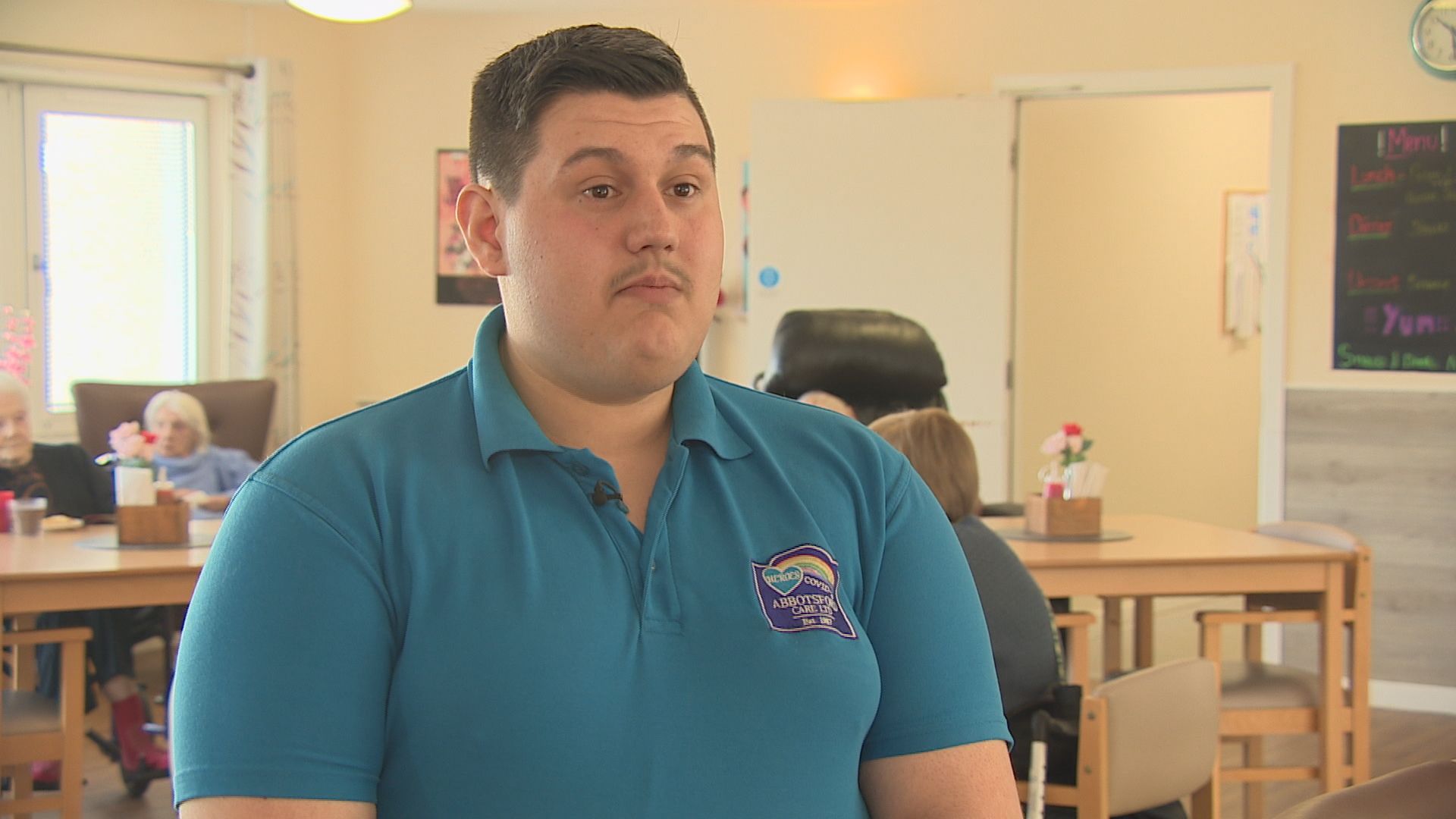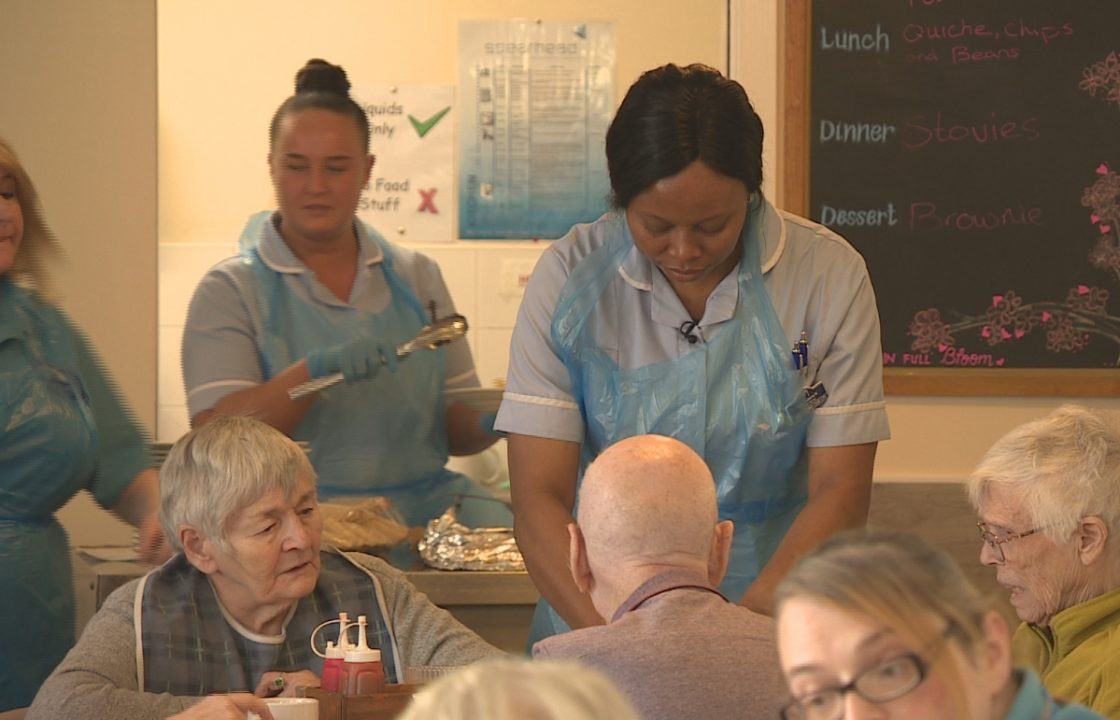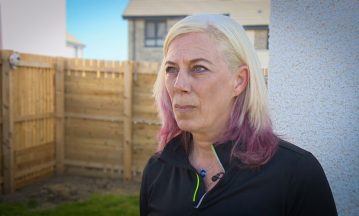Amina Adebisi usually sees around 18 or 19 clients a day.
She works for Call-In Homecare in Dundee, a service that helps people live independently.
“It may look like a simple job, like what does a carer do? But it involves a lot,” she told Scotland Tonight.
“You have to be physically healthy, emotionally healthy too, because when you go in there, you might be the only contact they have every day.
“One thing I always have at the back of my mind is the people we care for they’re not, like, sick. They only grew old.”
Amina starts her day at 7am and finishes at 10pm, with a two-hour break in the middle of the day.
She only has time to visit her clients for a short amount of time, but when she’s there, she helps them with whatever they need or can’t do themselves. For example, she helps them bathe, prepares their meals, and ensures they have had their medication.
“What I like most about the job is it’s a way of giving back. Working with the vulnerable and elderly to me is like a blessing, you know, so I really appreciate that,” Amina said.
 STV News
STV NewsAmina’s pay recently went up from £10.90 to £12 an hour, in line with the real living wage. The increase was part of a Scottish Government initiative designed to help the sector with recruitment and allow workers to better ‘support their families’.
Amina, a mother of four, said: “I appreciate it. But things are getting expensive every day, so we didn’t even feel the difference. I went shopping immediately and I had virtually the same thing I would have left if I had gone shopping before.”
Amina is paid very little for the time it takes for her to walk from one client’s home to another – just £8 for four days’ worth of walking
Moira Steel, one of Amina’s clients, told Scotland Tonight that she wouldn’t be able to manage without Amina.
“They don’t get paid very well but their job is very important,” she said. “When you’re on your own and somebody comes in, it’s really good. You look forward to them coming in.”
Having someone like Amina around means Moira is less likely to rely on the NHS.
It’s a service that takes pressure off the system – and it’s in demand. There are thousands of people waiting for a care assessment for care at home.
There are currently more job vacancies in Scotland’s care industry than ever before.
But low wages, major changes to visas for workers from overseas, and a lack of clarity on the delayed National Care Service are causing concern among those on the ground.
Lindsay Weir, a service manager for Call-In Homecare, said: “I think the complexity of people (who need) care at home is more than it ever used to be.
“If I look back to when I first started in care, it was, you know, that typical thing of what people perceive care at home, toast and tea, a chat and and more of the social aspect of it, where people’s medical needs and physicals as well have become a lot more within the community.’
 STV News
STV NewsLindsay is campaigning for her team’s pay to be bumped up to £15 an hour.
“I have family members that work within health and social care,” she said. “I’ll also have people who work within the childcare industry as well as family members and I see the inequality and the value that I feel there is there within pay for the tasks that we do out there, helping those vulnerable people.”
Lindsay says it’s impossible for the industry to deliver care for cheaper.
“It’s absolutely an industry where there’s not a high percentage of profit involved. I think it’s about the government, local authorities, all valuing what people do and that recognition and making that equal across the board.”
‘Staff morale can go quite low’
Tyrone Farlan is also feeling the pressure that comes with low wages.
He did his school placement at Abbotsford Care’s Headwell House in Dunfermline six years ago and has never left.
He said: “When I first started from school I originally got £9 an hour and I think I maybe was 15-16, so that was fantastic for my age at the time. But I’m almost 21 and we just went up to £12 an hour.
“So the NHS they’re paying per hourly a lot more than what private sector do. So a lot of our care staff are here for maybe six months to a year.
“Staff morale can go quite low, especially when that happens because we all develop friendships and all of the staff speak to each other.
“But the hardest part is when someone you work with quite well leaves for better money and then everyone’s kind of flat for a couple of days and then we get new starts and then our hopes go up. Then eventually, another staff member leaves, so it’s a really vicious cycle.”
 STV News
STV NewsTyrone is incredibly passionate about his job and wants to stay in the industry, but the rising cost of living has made it tempting to look at NHS jobs.
“It’s really not fair because we’re doing the same amount of work, we’re doing exactly the same,” he said. “We’re doing the same job as the hospitals are and we’re not getting the same amount of pay for it. So it’s really, really hard.
“But I don’t think I could bring myself to leave here now because I enjoy where I am.’
‘I can’t do without my family’
Many providers like Abbotsford have looked further afield for staff. But now doing so has become much more difficult.
Since March, there have been key changes to care worker visas. People sponsored to work in the UK as care workers are now unable to bring dependents when they migrate to the UK. This means they can’t bring their family over, even if they have already moved here themselves.
As of September last year, 101,000 Health and Care Worker Visas were granted, with around 120,000 Dependent Visas going to family members.
Juliana Agbo moved from Nigeria to Scotland with her young family in 2021. Her husband was sponsored by his work, so she was able to move here on his visa. This means her family is “safe” from the changes, but Julianna says the new rules are a step in the wrong direction.
She said: “So many people are seeing themselves back home because they can’t even bring their dependents. I wouldn’t be here if I wasn’t given the opportunity to bring my kids because I’m a very family oriented person. I can’t do without my family.”
Julianna says many of her friends who work in care and were hoping to have their families join them are now faced with two options: leave to be with them or stay here alone.
“I am no immigration officer, but if you check the number of people that were here last year and the number of people in here this year, I think it has totally gone down. So they are just looking for another opportunity or another country that will give them such an opportunity.”
Scottish Care says between 10-15% of Scotland’s care sector come from international communities. But because of the changes, that is due to drop.
Julianna says it makes her friends, and others from abroad, feel unwelcome.
The Home Office told Scotland Tonight that “care workers make a vital contribution to society, but immigration is not the long-term answer to our social care needs”.
A spokesperson said: “Care workers on a Health and Care visa can apply to extend their stay, change employers and settle in the UK. Those in the route before March 11 can continue to bring and be accompanied by their dependants.”
Alyson Vale, business and operations director of Abbotsford Care, says the changes have already resulted in a lot of people from overseas deciding against making the move.
She said: “I think the rules that have changed recently are really enabling short termism. They’re only about getting people over, filling a short term gap, and not about the long term sustainability of people moving to this country, living in this country and embedding themselves in the community.”
 STV News
STV NewsSocial care is close to Alyson’s heart and it’s a family affair – her parents started the business in the 1980s.
Alyson said: “I think if no changes are made (in the sector), we’re going to lose local providers. We’re going to lose local provision and we’re going to move away from small one off, single home operators and push down to a corporate market, which is going to be overrun by private equity companies. I think we will lose that sense of community if we’re not careful.”
Alison went on to tell Scotland Tonight: “Everybody is experiencing the same thing, whether it be here or whether it be the top of Scotland or the bottom of Scotland. You know everyone together is recognising the importance of addressing these issues because they’re all impacting us.”
Aside from additional funding for wages, the main thing that Alyson believes would make a huge difference to social care is public perception.
Alyson added: “Over the years things have changed so much within the social care sector and I think a lot of people have previous assumptions and understandings of what they think it might be, what it might do, but I think so much has changed. We are working to make things better all the time with all the improvements.
“We need to encourage people to realise that social care is a thing that’s present for everybody. It’s not something that needs to live in the background of society. If we can all stress the importance of social care that would probably be the best thing moving forward.”
When asked by STV News if the Scottish Government is appropriately investing in social care, Alyson said she isn’t sure.
“I’m just not sure right now that a National Care Service is the answer, because I don’t know what it means,” she said.
“Everybody feels a wee bit left out of the picture and actually the more we’re not involved and the more that people are kind of pushed out from the conversation means that we’re not gonna get the results that the sector needs practically to be able to implement the changes that need to happen.”
Scottish Government – ‘It remains a challenging situation’
Scottish Health and Social Care Secretary, Neil Gray, spoke with Scotland Tonight about the challenges faced by the social care sector.
He said: “We have invested £230m in order to bring social care pay up to £12 an hour, which was a record increase. I recognise even in spite of that the UK cost of living crisis means that for many people working in social care it remains a challenging situation and we will keep looking at what we can do to provide greater support.
“A number of the visits and engagements that I’ve had over the last week or so have been with social care organisations in order to hear directly from them both as employers and those providing the care directly.”
When asked about why the National Care Service has been delayed and debated by seven Holyrood committees, Gray said the service remains a priority.

“We’ve obviously been listening to those across the trade union movement in local government and those care providers around how we can make sure that we can effectively deliver a national care service.”
“We are in the process of delivering the legislation. We’ve passed stage one. We’re now in the process of stage two. I think that will help to make a difference in bringing up the standards of those employed within the service and also provide an increased consistency of delivery for those that require the services that are delivered across social care.’
On the topic of major visa changes for overseas care workers, Gray said Scotland relies on migrant labour, and that he wants the Scottish Government to have more control.
He said: “We have made very clear that the changes that the Westminster government have come forward with around visas and immigration for people working in social care and being able to bring their dependents is folly. It is crazy. It is self-defeating and we want to see that scraped.”
Watch the full Scotland Tonight report on the challenges facing Scotland’s care sector workforce on the STV Player.
Follow STV News on WhatsApp
Scan the QR code on your mobile device for all the latest news from around the country
























